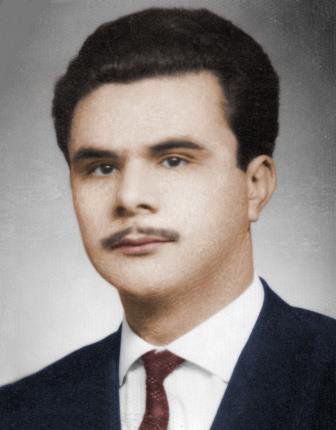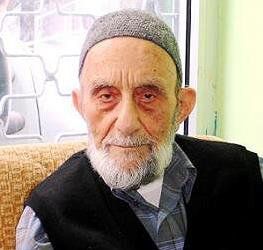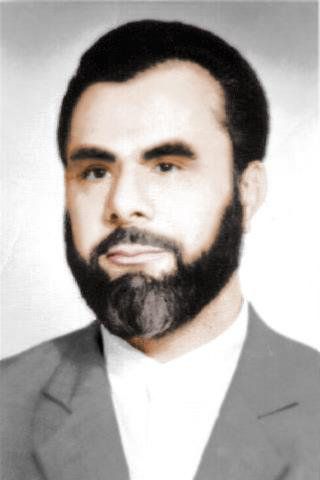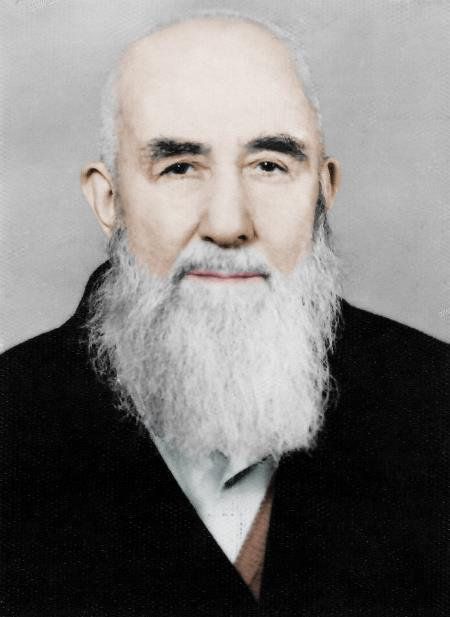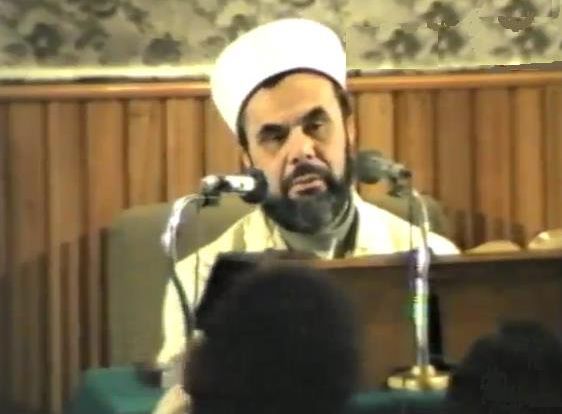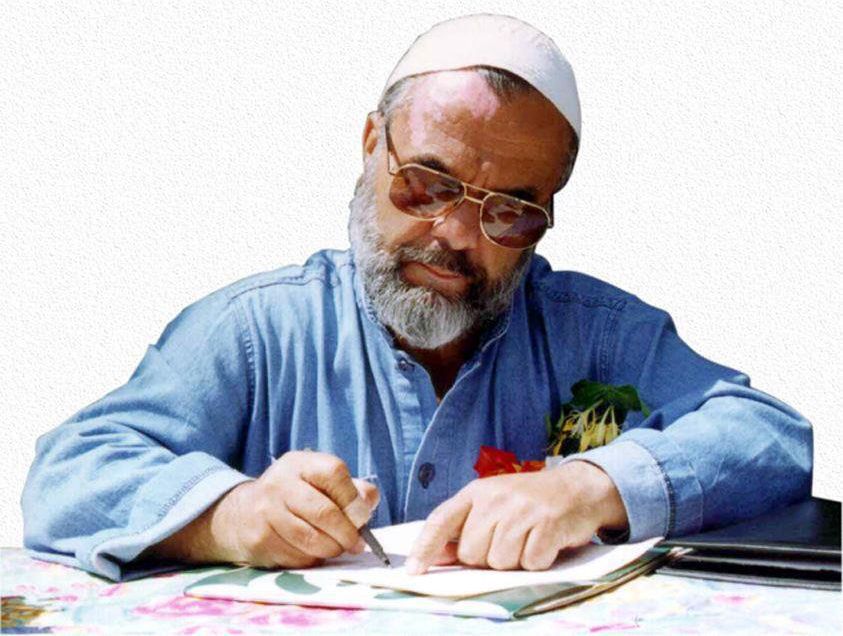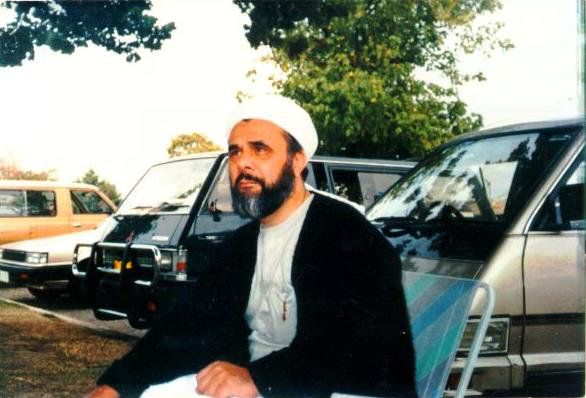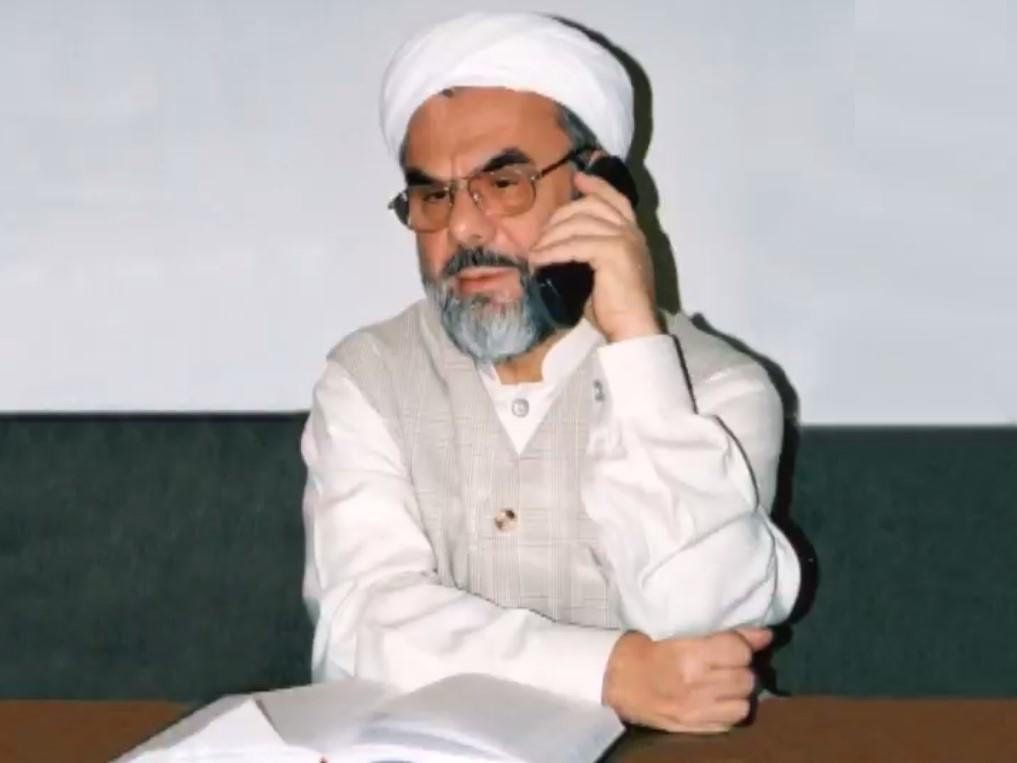PROF. DR. MAHMUD ES’AD COŞAN
(April 14, 1938 - February 4, 2001)
Prof. Dr. Mahmud Es'ad Cosan was born in Ahmetçe Village, Ayvacik County, Çanakkale Province, in the western part of Turkey on April 14, 1938. His father is Halil Necâti Effendi; mother, Shadiye Khanim. From both his paternal and maternal sides, his ancestors were descendents of Prophet Muhammad, and they had moved to Çanakkale from Bukhara.
While Prof. Cosan was a child, his family moved to Istanbul. He had his schooling in Istanbul, graduating from Istanbul Vezneciler Elemantary School in 1950 and from Vefa Lisesi in 1956. The same year he was admitted to Istanbul University.
Prof. Cosan attended classes in the Arab-Persian Philology Department of the College of Arts and Literature at the University of Istanbul. He obtained his B.A. in 1960 with four certificates from Arabic Language and Literature, Persian Language and Literature, the History of Middle Ages and Turkish Islamic Arts.
In the same year, he joined the College of Theology of Ankara University as a research assistant in the Department of Classical Turkish Religious Texts. He managed the secretariat work in the College Publication Committee for two years. In 1965, he received his PhD by completing a dissertation on the fifteenth century poet Hatipoglu Muhammad and his works. In 1967-68, he taught Turkish and Humanities courses at the Ankara Yükselis Engineering and Architecture School.
Prof. Cosan served in the military as an officer. He started his military service in Tuzla Infantry School on October 15, 1971. He completed the service on December 31, 1972 in Patnos, Agri as a Second Lieutenant.
After the military service, he returned to Ankara University and resumed his academic activities. In 1973, he became Associate Professor with his thesis on the Maqalat of Hajji Baktashi Veli (The Articles of Hajji Bektashi Veli) and became a faculty member in Turkish-Islamic Literature Department. In 1977-80, while teaching at the College of Theology, he also taught Turkish Language and Literature at the Sakarya Government Architecture and Engineering Academy. He also lectured as a visiting professor at various universities abroad.
In 1982, he became full Professor with his work "Ibrahim-i Muteferriqa and Risâle-i Islâmiyye." In order to devote more time to his social and cultural activities, he asked for his retirement and left the university in 1987.
Prof. Cosan RhA took his early Islamic education in his family. His grandfather Molla Mehmed Effendi was an educated man who had attended the madrasas in Istanbul. He was also a disciple of Hadrat Ahmed Ziyauddin Gumush-khanewi RhA. He was martyred in Çanakkale War during the World War I. Prof. Cosan's father Halil Necati Efendi, too, is an educated person. He completed the memorization of the Qur'an at an early age while he was in his village. He attended the madrasa of Çirpilarli Hajji Ali Efendi who belonged to the Gumushkhanawi Dargah. He was initiated to the tariqa by Ali Effendi. When the madrasas were closed by the government, he returned to his village and married Shadiye Khanim (1928). Shadiye Khanim, too, was an educated lady from the same village. They had five boys and two girls from this marriage. Prof. Cosan was the fourth child of the family.
In 1942, Halil Necâti Effendi moved to Istanbul in order to send his children to school. He ran a business with his brother-in-law for
a while. Meanwhile, he attended the discourses of Hasib Effendi of Serez at Shahzadebashi Damat Ibrahim Pasha Mosque. After Hasib Effendi passed away, he became a disciple of Abdulaziz Bekkine Effendi of Kazan and attended the discourses at Ummugulsum Mosque. Upon the recommendation of Abdulaziz Effendi, Halil Necati Effendi took an exam and started working for the Mufti's office in Fatih, Istanbul. After Abdulaziz Effendi died in 1952, he attended the discourses of Mehmed Zahid Kotku Effendi. He was a very close friend and student of Sheikh Mehmed Zahid Kotku, regarded as the most influential Islamic figure of Turkey in the late twentieth century.
Having been so immersed in a spiritual environment, Prof. Cosan in his youth attended the talks and discourses of scholars and Murshids and received their material and spiritual blessings.
After graduating from the university, in 1960 Prof. Cosan married Muhterem Khanim, the daughter of Mehmed Zahid Kotku Effendi. In the fall of the same year, he moved to Ankara to start his academic career in Ankara University.
While he was a faculty member at the College of Theology, Prof. Cosan had an "open door" for everybody. He earned the love and respect of students and colleagues. Students would come to him, describe their problems, consult with him, get answers and leave with smiling faces. During the time that there were anarchy and terror at schools, he would talk to the students and ask them to use common sense.
In 1960s, there were no courses on the Qur'an in the College of Theology. Students would try to learn the Qur'an on their own with their knowledge of Arabic and Persian. Prof. Cosan would volunteer to teach them the Qur'an and old Turkish script. He would encourage students to do academic work, to get master and doctoral degrees.
He was highly esteemed among his colleagues, and was an expert in his field. Especially in the Turkish-Islamic Literature field, he was the leading scholar whom everybody consulted. Even his professors would bring him texts that were difficult for them to read and understand. He would try to be helpful to everyone.
During his first years in Ankara, he resided in the Kurtulus section of Ankara. In 1963, he moved to Kalaba section of Ankara. There were no mosques in their neighborhood. He took a leading role in establishing a mosque there. They inaugurated a Qur'an Course and Mosque in a building. He had hadith and tafseer study sessions in that mosque.
He had excellent relationships with his neighbors. Despite his tiring and extended hours of work, he would allocate time to visit his neighbors. He always displayed a smiling face. During the visits, he would take a book from the bookshelf, ask somebody to turn a page, and read something from that page. That is how he would initiate a discourse.
His father-in-law, Shaikh Mehmed Zahid Kotku, would come to Ankara almost every year and stay with them for a while. When he was in Ankara, there would be discourses at various locations within Ankara and in the suburbs of Ankara, as well. Sometimes Mehmed Zahid Effendi would take Es'ad Effendi to go to various cities throughout Turkey.
In1977, Sheikh Mehmed Zahid Kotku made him sit in the pulpit of Iskenderpasha Mosque (the center of the tariqa) and told the congregation that Prof. Cosan would conduct the hadith discourses from that day on. Thus Es'ad Cosan started the hadith discourses at Iskenderpasha. He would go to Istanbul for the hadith discourse on Sunday and return to Ankara after the discourse.
When Mehmed Zahid Kotku Effendi was sick and hospitalized, Prof. Cosan attended and served him. Mehmed Zahid Kotku appointed him as his successor while he was alive. He undertook all of the responsibilities of the congregation and the guidance duty in the tariqa when Mehmed Zahid Kotku passed away on November 13, 1980.
The tariqa of Shaikh Mahmud Es'ad Cosan is identifed through his shaikh Mehmed Zahid Kotku Effendi as the Naqshbandi Tariqa, Khalidiyya Branch and Gumush-khanewi subbranch. He was also authorized to guide in Qadiriyya, Suhrawardiyya, Kubrawiyya, Cheshtiyya, Mawlawiyya, Khalwatiyya, and Bayramiyya tariqas.
In his time, interest in attending the hadith discourses increased considerably, so the Iskenderpasha mosque was expanded and enlarged five or six times. Buildings next to the mosque were purchased and annexed to the mosque. In addition to this, new periodic Hadith discourses were introduced in the cities of Ankara, Izmir, Bursa, Sapanca, Izmit and Eskisehir.
He had established a charitable foundation named Hakyol Egitim Dostluk ve Yardimlasma Vakfi--the True-Path Education, Friendship and Relief Foundation--upon the recommendation of Shaikh Mehmed Zahid Effendi. After 1980, he became personally involved in and improved the activities of this foundation. He opened branches of the foundation in many cities. He worked to spread the activities of education, assistance and cooperation.
He also founded the Ilim, Kultur ve Sanat Vakfi (the Science, Culture and Art Foundation) to conduct activities in culture and art, and the Saglik Vakfi (the Health Foundation) for health related activities. For the education of women, he has had hundreds of women's associations established. He also had hundreds of Ilim, Ahlak Kultur ve Çevre Dernekleri (Science, Morality, Culture and Environment Associations) founded for environmental activities. He aimed to bring people together and to have them organized for common objectives.
Furthermore, he got involved in the restoration and renovation of some historical buildings and works, which were left by Muslim ancestors. He restored them to their original use. Among such works are Ahmed Kâmil Tekkesi, Selami Mustafa Effendi Tekkesi, Shaykh Murad Effendi Dergahi, and Shadiye Khatun Health Complex.
Prof. Dr. M. E. CosanIn order to promote Islamic awareness and education he turned to the media. He established a publishing company: Vefa Yayincilik. In 1983, the monthly magazine Islam was initiated. Two years later, another monthly periodical Kadin ve Aile (Women and Family) and a bimonthly periodical Ilim ve Sanat (Science and Art) were added to the publications. Gül Çocuk for children and Panzehir magazine for health and science were published later on. Professor Cosan became actively involved in these publications by guiding them and writing editorials for them.
These magazines assumed a leading role in their fields to inform society. They contributed to the formation of Islamic awareness through research papers, news from the country and from the Muslim world, and other articles. They formed an ideal atmosphere in which many good activities were initiated. These publications and the activities of Professor Cosan became topics for dissertations
in western countries. The circulation of the periodical Islam exceeded 100,000 at its peak. These magazines were in publication until June 1998.
He founded Seha publishing house to publish books; numerous books have been published in the field of religion, literature, history and culture. For the development of Islamic printed media, he took further steps. He wanted to initiate a weekly periodical and a daily newspaper. With his efforts, Ahsen printing house and Deha desktop publishing and graphical design firms were established. Later, a daily newspaper called Sagduyu (The Common Sense) was published (May 3, 1998 - July 11, 1999).
In order to broadcast programs which support the Islamic and national values, he initiated the establishment of AKRA (White, Clean Radio) radio station (1992). The radio station broadcasts in Istanbul; however, it can be heard through Internet and via satellite in all parts of Turkey, Europe, North Africa, Middle East and Central Asian Republics. With the encouragement of Prof. Cosan
and for the same purpose, AK-TV television channel was up for local broadcast over the Marmara region (1997).
Prof. Cosan urged that private schools be established in order to have quality education and academic excellence. In many cities, private kindergarten, primary and secondary schools have been established. He also encouraged the establishment of private polyclinics and hospitals. As a result, many health facilities have been established throughout Turkey. Hayrunnisa Hospital, Esma Khatun Hospital, Afiyet Hospital, and Shadiye Khatun Polyclinic are just a few.
Prof. Cosan also was effective in the establishment of a travel and tourism agency, Iskenderpasha Tourism (ISPA). He wanted tours to the Muslim world to be organized to make communication
and traveling easier among Muslims living in all parts of the world. This agency organized various Hajj and Umra programs, domestic and international trips and educational gatherings.
Having understood the need and importance of independent, knowledgeable and sincere imams, Prof. Cosan founded Fiqh, Hadith and Tafseer institutes in Istanbul, Ankara, Konya and Bursa. Students and graduates of Theology Colleges were admitted to these institutes. Private lecturers and scholars taught Arabic, Hadith, Tafseer, Fiqh, Aqaid and Tasawwuf to the students.
Prof. Cosan traveled extensively inside and outside Turkey because of tremendous interest in his talks and views. He was invited to many parts of the world and participated in many conferences, seminars and talks. He attended numerous educational programs including family and youth camps in Europe, North America, Africa, Middle Asia, and Australia.
Every year Prof. Cosan met and established dialog with the Muslims who came for Hajj and Umrah from different parts of the world. He did not confine himself to one country only but to the entire Muslim world, seeing Muslims as parts of a whole body. He guided and warned Muslims inside and outside Turkey. He offered countless suggestions, recommendations and solutions to the problems Muslims globally face. He did not hesitate even one minute to urge and support the truth, the good, and the beautiful.
He encouraged all Muslims to do likewise.
Furthermore, Prof. Cosan stated the norms of clean politics for Muslims in all countries. Being a non-partisan scholar, he set up the principles and methods for electing truthful, moral, religious, competent and educated public officers from local mayoral candidates to prime minister and president of a country. He believed that only administrators with these qualities could deliver justice, peace and prosperity to a country and humanity.
In May 1997, Prof. Cosan left Turkey to conduct activities outside the country. In 1998, he settled in Brisbane, Australia. He spread his guidance activities throughout Australia. With his leadership, many mosques and educational centers have been established throughout the continent. He started daily hadith discourses (one after Fajr prayer, the second one after Isha prayer) in Brisbane Mosque.
Prof. Cosan maintained his weekly radio addresses. In addition to his Friday Hadith Discourses on the radio, he initiated Tuesday Tafseer Discourses (September 29, 1998). He started from the
Surah Fatiha and explained a few verses in each discourse. He had advanced to the verse 224 of Surah Baqara, yet his life was cut too short to complete the tafseer of the entire Qur'an.
On Sunday, February 4, 2001, around noon, Professor Cosan, headed to the city of Griffit to inaugurate a mosque. While in the vicinity of Dubbo, Sydney, he was involved in a traffic accident. He and his son-in-law, Prof. Dr. Ali Yücel Uyarel, passed away. His sudden departure from this world saddened his family, relatives, disciples and all Muslims who knew of him.
After the funeral prayer at the Gallipoli Mosque in Auburn, Sydney, his body was brought to Turkey on February 8, 2001. On Friday February 9, 2001, another funeral prayer was held at Fatih Mosque in Istanbul. Hundreds of thousands of people attended the funeral. In the company of prayers and tears, Professor Cosan and his son-in-law were buried in Eyüp Cemetary, which is close to the tomb of Abu Eyyûb Al-Ansarî.
Prof. Mahmud Es’ad Cosan spoke Turkish, Arabic, Persian,
English and German. He continued to serve Islam and guide Muslims all around the world in all aspects until his death.
May he rest in peace, and his abode in the hereafter be among the highest ranks of Paradise.
Published Books of Shaikh Mahmud Es’ad Cosan:
01. Matbaaci Ibrâhîm-i Müteferrika ve Risâle-i Islâmiye (1982) (The Printer Ibrahim-i Muteferriqa and Risale-i Islamiyye)
02. Haji Bektashi Veli ve Maqàlat (Hadji Baktash Veli and his Work Maqalat)
03. Gayemiz (1987) (Our Aim)
04. İslâm Çağrısı (1990) (The Message of Islam)
05. Yeni Ufuklar (1992) (New Horizons)
06. Çocuklarla Basbasa (Amongst Children)
07. Basarinin Prensipleri (The principles of success)
08. Türk Dili ve Kültürü (Turkish Language and Culture)
09. Islâm'da Nefis Terbiyesi ve Tasavvufa Giriş (1992) (The Purification of Self in Islam and introduction to Sufism)
10. Avustralya Sohbetleri-1 (1992) (Australia Discourses 1)
11. Avustralya Sohbetleri-2 (1994) (Australia Discourses 2)
12. Avustralya Sohbetleri-3 (1995) (Australia Discourses 3)
13. Avustralya Sohbetleri-4 (1996) (Australia Discourses 4)
14. Yeni Dönemde Yeni Görevler (1993) (New Duties in the New Era) 15. Haccın Fazîletleri ve İncelikleri (1994) (The Virtues and Subtleties of Hajj)
16. Zaferin Yolu ve Şartları (1994) (The Path and Fundamentals of Victory)
17. Islâm, Sevgi ve Tasavvuf (1994) (Islam, Love & Tasawwuf )
18. Sosyal Çalışmalarda Organizasyon ve Başarı (1994) (Organisation and Success in Social Activities)
19. Güncel Meseleler-1 (1994) (Current Issues 1)
20. Güncel Meseleler-2 (1995) (Current Issues 2)
21. Hazret-i Ali Efendimiz'den Vecîzeler (1995) (The Jewels of Wisdom from our Master Hadrat Ali)
22. Haci Bektâsh-i Velî (1995) (Hadji Baktash-i Walî)
23. Yunus Emre ve Tasavvuf (1995) (Yunus Emre and Sufism)
24. Başarı Yolunda Sevginin Gücü (1995) (The Power of Love in
the Path of Success)
25. Islâmî Çalışma ve Hizmetlerde Metod (1995) (Methodology in Islamic Activities)
26. Sosyal Hizmetlerde Hanimlar (1995) (Women in Social Activites)
27. Ramazan ve Takvâ Eğitimi (1996) (Ramadan and Acquisition of Piety)
28. Teblig ve Irşad Çalişmalari (1996) (Dawah Activities)
29. Islâm, Tasavvuf ve Hayat (1996) (Islam, Tasawwuf and Life)
30. Haydi Hizmete!.. (1997) (Come to Serving Society)
31. Islâm'da Eğitimin İncelikleri (1997) (Subtleties of Education in Islam)
32. Tasavvuf Yolu Nedir? (1997) (What is Tasawwuf?)
33. Imanin ve Islâm'in Korunmasi-1 (1997) (The Protection of Faith and Islam 1)
34. Imanin ve Islâm'in Korunmasi-2 (1998) (The Protection of Faith and Islam 2)
35. Allah'ın Gazabi ve Riızasi (1997) (The Wrath and Pleasure of Allah)
36. Mi'rac Gecesi (1998) (The Night of Ascension)
37. Dogru Inanç ve Güzel Kulluk (1998) (True Faith and Good Servitude)
38. Ramazan ve Güzel Ameller (1998) (Ramadhan and Good Deeds)

